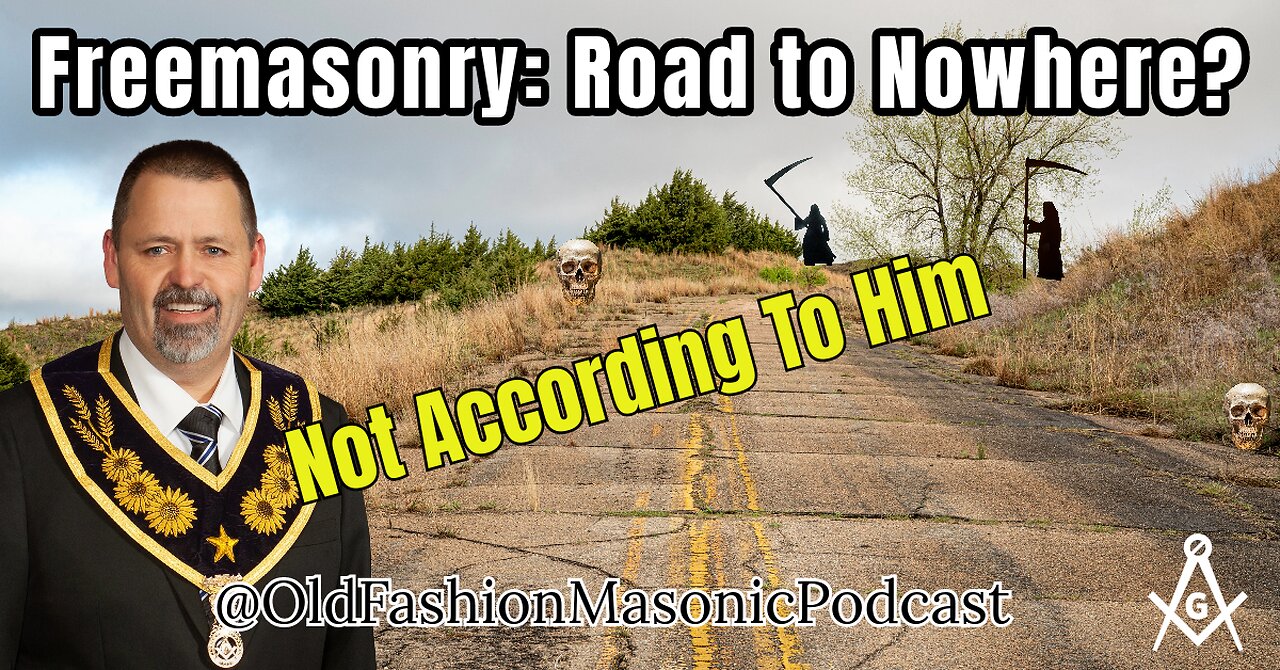Premium Only Content

Freemasonry: A Path to Enlightenment or a Road to Nowhere? – S2 E66
Freemasonry: A Path to Enlightenment or a Road to Nowhere? A Grand Lodge Officer Perspective
Freemasonry, a centuries-old fraternal organization, has long been shrouded in mystery, symbolism, and ritual. As we navigate the complexities of the 21st century, it is crucial to assess whether Freemasonry still holds relevance and significance or if it has become a "road to nowhere." In this essay, we will explore the history, principles, and contemporary relevance of Freemasonry, aiming to discern its place in the modern world.
History
Freemasonry's origins trace back to the late 16th and early 17th centuries, and it has evolved significantly over the centuries. The organization was established on the principles of fellowship, personal development, and moral improvement. In its earlier days, it played a substantial role in the Enlightenment period, where it championed the ideals of reason, tolerance, and individual liberty. The symbolism, rituals, and secrecy characteristic of Freemasonry were integral to this intellectual and philosophical movement.
Relevance in the 21st Century
Brotherhood and Social Support: In an increasingly digital and disconnected world, the sense of brotherhood and community provided by Freemasonry remains relevant. The organization offers a space for genuine, in-person connections and support networks that many individuals yearn for in the modern age.
Personal Development: The commitment to self-improvement is a timeless aspiration, and Freemasonry continues to provide a structured environment for members to reflect on their values and develop their character. This self-improvement can be applied to various aspects of life, including career, family, and personal relationships.
Philanthropy and Service: Freemasonry's emphasis on charity and service to others is as pertinent today as ever. Many Masonic lodges are actively involved in community service and charitable endeavors, making a positive impact on society.
Historical and Cultural Significance: Freemasonry's rich history and symbolism contribute to its continued appeal, not only to members but to those interested in its traditions and philosophy. Its influence on art, literature, and political thought remains an integral part of our cultural heritage.
However, some critics argue that Freemasonry is outdated and anachronistic. They point to its secretive nature and exclusive membership, which can be perceived as non-inclusive and antiquated. Additionally, the decline in membership in some regions raises questions about its long-term viability.
Conclusion
Is Freemasonry a "road to nowhere" in the 21st century? The answer is not absolute. While some aspects of Freemasonry may appear antiquated, the core principles of personal development, community service, and fellowship continue to resonate with many individuals. In an age marked by disconnection and an absence of moral guidance, Freemasonry provides a path towards personal growth, self-reflection, and community involvement.
Ultimately, the relevance of Freemasonry in the 21st century depends on an individual's values, interests, and the specific goals they aim to achieve. For those who seek personal enlightenment and a supportive community, Freemasonry remains a path worth exploring.
While it may not be for everyone, it is far from being a "road to nowhere." Freemasonry's enduring legacy and principles ensure that it will continue to play a unique and valuable role in the lives of its members and the broader society.
#Freemasonry #Freemasons
This podcast reflects the views of only the members participating in the podcast. They do not necessarily reflect the views of their Lodge, Shrine Center or Grand Lodge Jurisdiction.
-
 20:01
20:01
Old Fashion Masonic Podcast
1 year agoJames Naismith; Inventor of Basketball and a Masonic Hero Thief? S2 E71
266 -
 LIVE
LIVE
The Rabble Wrangler
12 hours agoThe Best in the West Plays Battlefield 2042 | Road to BF6 Grind
35 watching -
 LIVE
LIVE
JTtheSG
1 hour agoBack To The Deadzone!!!
70 watching -
 LIVE
LIVE
The Official Steve Harvey
13 days ago $5.11 earned24 HOURS OF MOTIVATION w/ STEVE HARVEY
332 watching -
 25:56
25:56
DeVory Darkins
22 hours ago $0.78 earnedTrump drops ULTIMATE BOMB on Democrat Mayors as ICE makes SHOCKING Announcement
47.4K171 -
 3:36:30
3:36:30
TonYGaMinG
6 hours ago🟢 ABI WITH FRIENDS | 🍩JOE DONUTS | 😶 🌫 VLADSGAMINGCARTEL |
25.4K4 -
 21:24
21:24
marcushouse
13 hours ago $0.12 earnedStarship Flight 10: Go or No? 🚀
34.3K13 -
 6:25:15
6:25:15
MrR4ger
18 hours agoSUNDAY FUNDAY w/ R4GER - VARIETY ANOTHER FCKN STREAM CRASH
27.9K -
 5:40
5:40
WhaddoYouMeme
4 days ago $0.32 earnedThey’re Calling This the End of Masculinity
40K36 -
 15:24
15:24
Tactical Advisor
21 hours agoBest 2011 of 2025 | Bul Armory Ultralight Pro
37.3K2